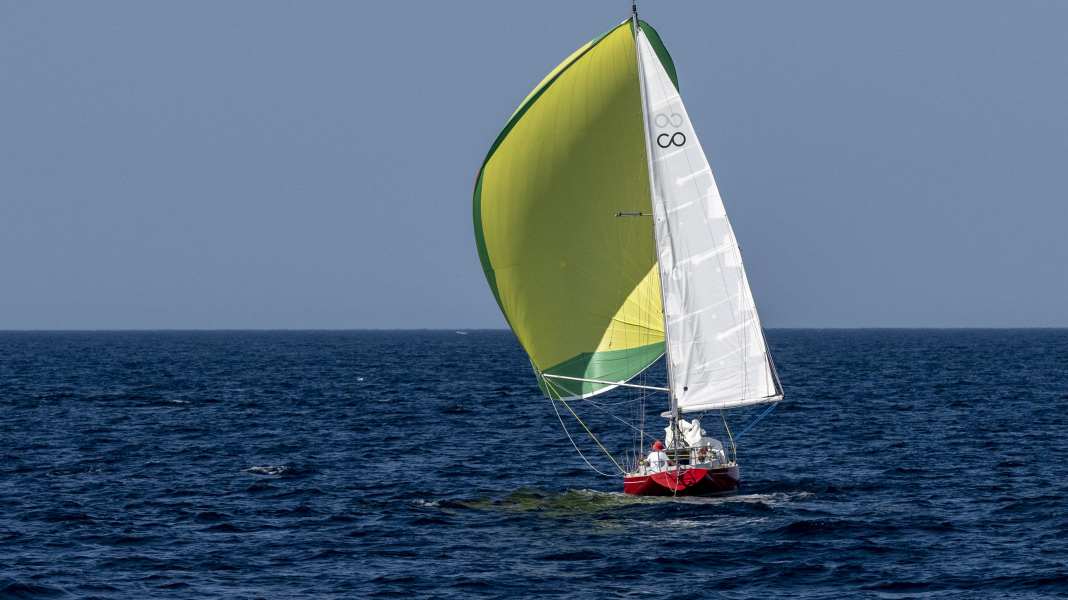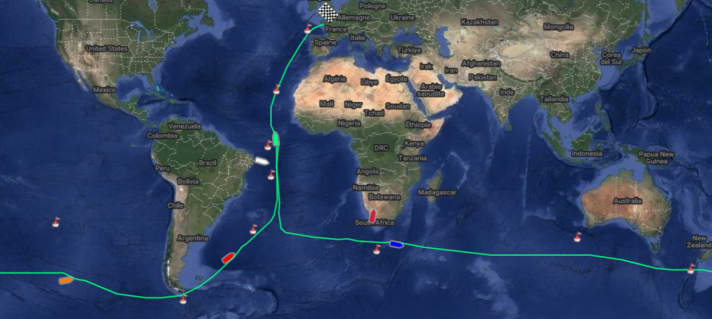
She's at it again: the exceptional sailor Susanne Huber-Curphey has left the route of the Longue Route and is now sailing her "Nehaj" eastwards towards the Indian Ocean. You can tell from her Tracker on which she notes her position and a small note every day. This is the second time that the multiple circumnavigator has left the race at this point. Back in 2018, she took part in the Longue Route and turned eastwards into the Indian Ocean after rounding Cape Horn instead of sailing back to the starting point in Lorient, France.
Blue water letters foreshadow new route
It is not immediately clear from her notes where she is sailing to. However, one direction can be surmised: In her so-called blue water letters, which are written on the Longue Route page Huber-Curphey reports in detail on her experiences at sea. In it, she describes, among other things, a radio contact she had with a Royal Air Force pilot who was doing laps over her in his aircraft south of the Falkland Islands. When the pilot asked her where she was travelling to, she said: "I'm sorry, my destination is still unknown. It could be the Caribbean islands or St Helena or maybe on to Tasmania and New Zealand."
Following in Moitessier's footsteps again
At the beginning of February, she sailed round the Cape of Good Hope again, where she had already passed four and a half months previously. It can therefore be assumed that her journey will take her further east than the Caribbean islands or St Helena.
More on the topic:
As she did the first time, she is resolutely following in the footsteps of Bernard Moitessier. In 1968/69, he took part in the Sunday Times Golden Globe Race, the first non-stop single-handed race around the world. Instead of sailing back to Plymouth in England and winning the race, he continued his journey to Polynesia in 1969, forgoing certain victory and making sailing history in the process.
The spirit of freedom
To revive this spirit of freedom and celebrate the 50th anniversary of the voyage, Franco-American Guy Bernardin created the Longue Route. This is not a regatta in the classic sense, but rather an adventure trip among like-minded people. Participants sail around the three capes of the world in the footsteps of Moitessier without support or stopovers. There is no timekeeping, no prizes and only a few rules. Instead, it's all about realising the dream of freedom at sea. The fact that Susanne Huber-Curphey is now travelling on a new course does not contradict the regatta rules. Rather, it continues the idea of the race.
Field reduced to three participants
Three of the six boats that started are still on course for the starting point of the Longue Route. They are expected to arrive there in April. Pierre-André Huglo is in the lead. The northern Frenchman also took part in the first edition of the Longue Route in 2018 with his Contessa 32 "Fresh Herring". When he last reported at the beginning of February, he was north-east of Recife, Brazil, and about to make the leap across the equator.
Frédéric Switala follows with his converted Admiraler 44, the "Man of War". He circumnavigated Cape Horn at the end of January and, by his own account, battled with difficult conditions. He reports waves five metres high and wind speeds of over 40 knots. He is currently north-east of the Falkland Islands, where conditions appear to have calmed down.

Participants eliminated before Cape Town
Alfonso Pascual is in last place with his "Cyrano", the second Contessa 32 in the small field. He had to make a 38-hour stop off the Tasmanian coast due to problems with his wind steering system. He managed to repair it so that he could continue his journey. In the meantime, he has left Point Nemo in the South Pacific behind him and is now heading for the last of the three capes to be rounded, Cape Horn.
Eymeric Maiffredy, who reported on his circumnavigation of the Cape of Good Hope in December, has since given up and is now moored in the harbour of Cape Town, South Africa.

